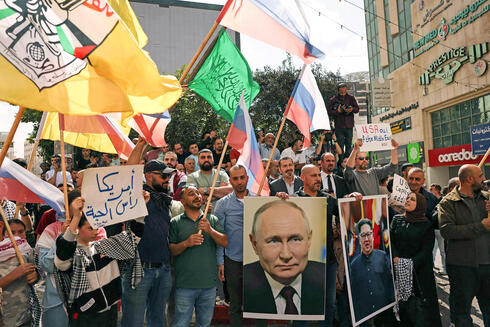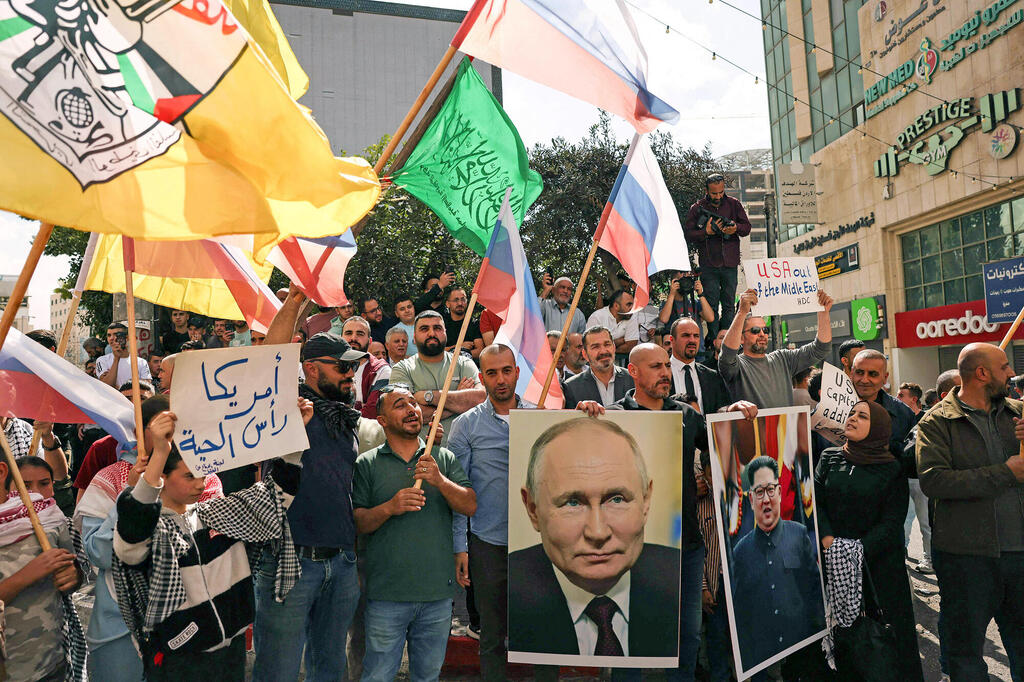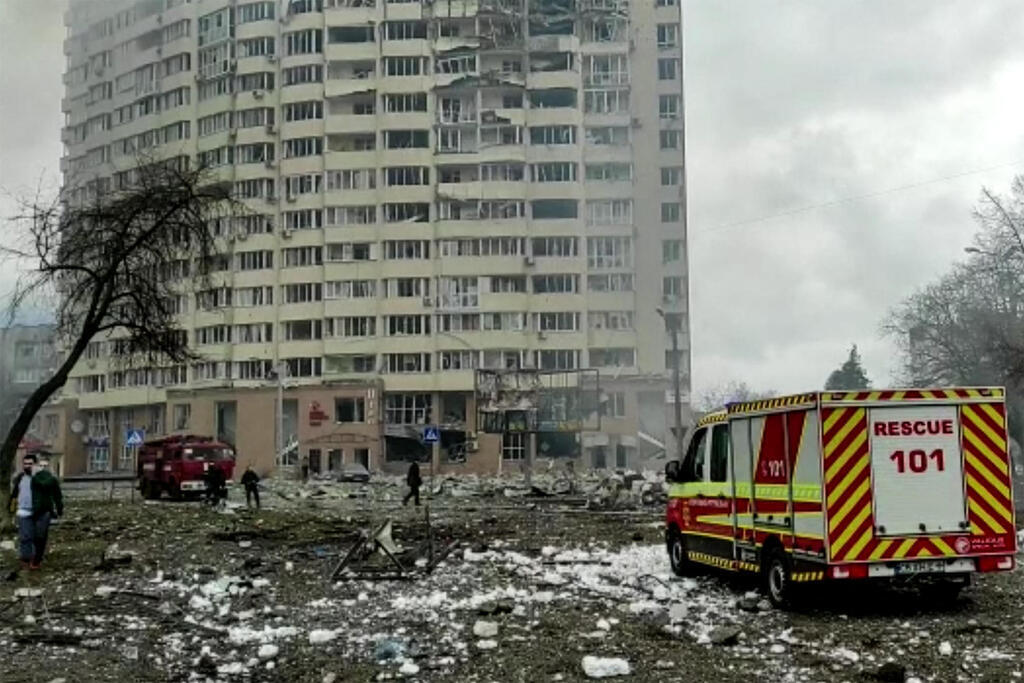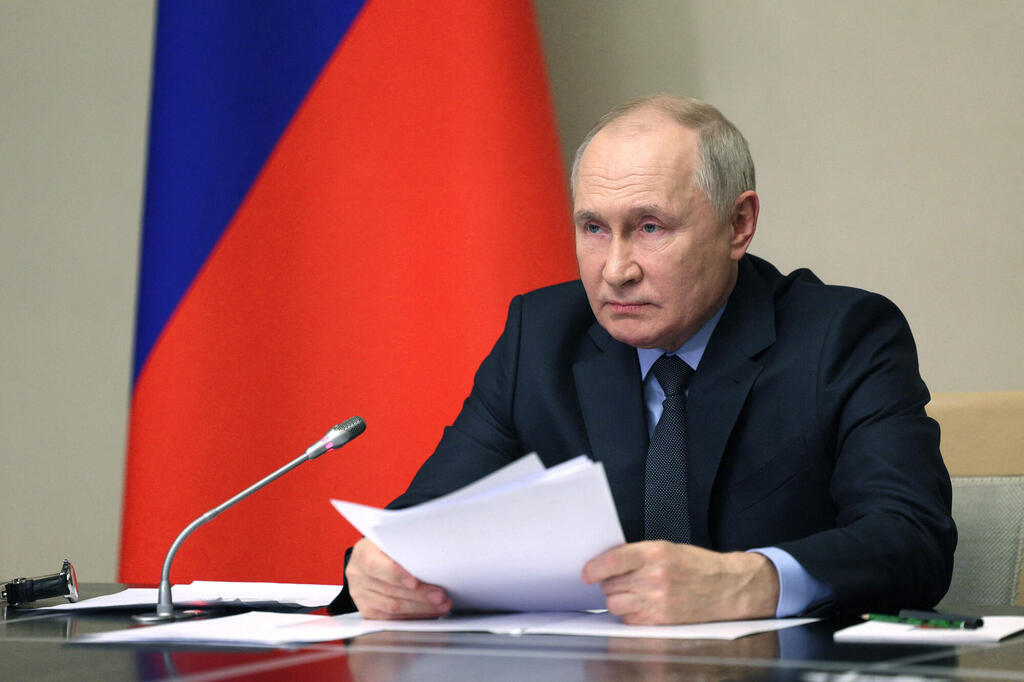
ISRAEL AT WAR
Hamas' war on Israel is the best present Putin could have hoped for
Military historian Prof. Danny Orbach spoke to CTech about how Hamas’ attack against Israel has furthered Russia’s geopolitical and economic interests beyond her wildest dreams, Israel’s failed Russia policy, and the specter of the Cold War.
On October 7, Russian President Vladimir Putin celebrated his 71st birthday. Russian State TV (Kremlin-sanctioned propaganda) was awash in celebrations, the icing on the cake being Hamas’ surprise attack on Israel in which they massacred 1,400 Israelis and abducted nearly 250 more, with many pro-Kremlin channels gleefully mocking the attack. Marat Bulatov, who hosts “Day Z” a pro-Kremlin Russian program, sent best wishes to his “sovereign” and began the show by reading birthday messages from the audience, including, “It’s not like last year, when the Crimean bridge was destroyed for Putin’s birthday. We only have good news today!” Bulatov responded, “Yes, I completely agree!”
3 View gallery


A pro-Hamas rally in Hebron with Russian flags and posters of Vladimir Putin and North Korean leader Kim Jong Un.
(Credit: Hazem Bader/AFP)
Certainly, for Putin, this war is perhaps the best present he could have asked for. Which is why it is so ironic that many of the same people who last year took to the streets in Washington D.C, New York, London, and Paris to protest Russia’s war on Ukraine and Iran’s brutal oppression of its own people are now protesting a war whose main beneficiaries are Tehran and the Kremlin.
While there is no evidence showing direct Russian involvement in Hamas’ October 7 attack, there are many indications that Russia has aligned itself with Hamas and Russia’s close ally Iran. Prof. Danny Orbach, a military historian and professor at Hebrew University, notes that Russia has compared the Israeli siege of Gaza to the Nazi siege of Leningrad, and the Russian ambassador to the UN said that Israel doesn’t have a right to defend itself because it's an occupying power, “which is far more extreme than everything they’ve said in the past.” This is on top of Russia hosting Hamas officials in Moscow (and not for the first or fifth time) prompting Hamas to announce that it was looking for hostages in Gaza that Russia asked to be released, “because we look at Russia as our closest friend,” said senior Hamas official Mousa Abu Marzouk.
While Orbach says that there are “rumblings” that Russia helped to train Hamas, he is certain that Russia didn’t know about the attack, which was highly secret. “It would have been complete madness to give the info to Russia because Russia is a highly corrupt country, and the chance that a Russian officer would have leaked it to Israeli intelligence would have been high. If you want secret information, the last thing you do is give it to Russia. Putin might have used it as leverage. But that isn’t to say that they didn’t participate in training Hamas or supporting Iran in its objectives against Israel.”
But even if it wasn’t explicitly sanctioned by the Kremlin, there is no doubt that Russia benefits from this conflict in numerous ways including through the diversion of attention from the war in Ukraine and the crumbling of Saudi normalization with Israel, which would “strengthen the position of the U.S. in the region, curb Russian influence and their ability to control energy prices,” says Orbach.
Russia also has enormous economic and geopolitical interests in the Middle East and has been competing for influence in the region for decades. One subject that has been hotly discussed in Israel is how this conflict has scuttled the India-Middle East-Europe Economic Corridor, a rail and shipping corridor linking India with the Middle East and Europe. This corridor would include a gas pipeline which would counter Russia’s hold on Europe and elsewhere.
The Saudi Crown Prince announced that his country invested $20 billion in the project - even before signing any peace agreement with Israel. This would have united Israel with the Gulf states more closely, threatening both Iranian and Russian interests. Some speculate that part of the rationale behind this U.S.-led project is to reduce European dependence on Russian gas and the general sphere of influence of Russia, Iran, and their allies.
Orbach says that “anything that would unite Saudi Arabia with the U.S. is bad for Russia especially due to Saudi interests in controlling oil prices.” He argues that the significance of the deal is less about reducing European dependence on Russian gas specifically since Europe is now purchasing much of its gas from Qatar, but reducing European influence on the Russian axis, which includes Qatar, a notable financier of Hamas. “Russia is an agent of chaos. They want to inflame chaos that will harm the U.S. and raise oil prices,” Orbach says.
Israel’s doomed Russia policy
Until October 7, Orbach says that Israel has long held a view of Russia that is “completely wrong,” based on a mix of practicality, lack of faith in Western support from some within the security establishment, and a long-standing fear of Russian power. While Russia has never been viewed as an ally of Israel, it was seen as a party that Israel couldn’t afford to alienate for practical purposes. “From Sharon to Netanyahu, there was a conventional thinking that Russia could at least be cooperative with Israel in some respects,” says Orbach. “As Russia competed with Iran for influence in Syria, it was seen as a balancing force that could help Israel curb the Iranian threat.” This view led to Israeli coordination with Russia when bombing Hezbollah targets in Syria, and is partly why Israel took a neutral stance during Russia’s war against Ukraine, in addition to a fear of blowback against Russia’s Jewish community.
3 View gallery


A bombed building in Chernihiv, Ukraine.
(Credit: AFP/ State Emergency Service of Ukraine)
This view is especially absurd given Russia’s close relationship to Iran in recent years. “It’s a long-standing relationship and since the war in Ukraine, Russia has become more dependent on Iran than ever. Iran is supplying Russia with drones which are extremely important in their war against Ukraine,” says Orbach. “So it makes no sense to see Russia as a balancing force to Iran in Syria. Israel cannot drive a wedge between Russia and Iran.”
Iran has been supplying Russia with UAV drones to bomb Ukrainian cities, prompting the Ukrainian government in August to submit a 47-page appeal to G7 countries requesting long-range missiles to attack production sites in Russia, Iran, and Syria. Israel has refused to provide Ukraine, an ally, with air defense systems out of fear of antagonizing Russia.
“Israel, according to this paradigm, saw itself as someone who could speak with Russia and viewed Russia as a somewhat neutral force [against Iran]. That’s why Israel took a somewhat neutral position on the Ukraine War.” But Israel’s neutral position was never appreciated by Russia, Orbach says. Israel’s attempt to remain neutral has only succeeded in cooling its relationship with Russia. “Either you're with them or against them.”
Orbach says that there have been some from the Israeli right as well as the military who have endorsed “pro-Russian views,” because they are wary of “Western progressivism, they think that the West misunderstands Israel, and believe that [the West] is naïve, soft and an unreliable partner. Such people thought that tilting to Russia was logical - which was delusional from the beginning.”
But Israel’s perception of Russia is born primarily out of a deeply entrenched historical fear. Israel was partly founded by refugees and survivors of the violent persecution of the Russian Empire and later the USSR. The USSR positioned itself as one of Israel’s greatest enemies, criminalizing Zionism, persecuting and imprisoning its Jewish citizens, and financing Arab armies in their wars against Israel from 1948-1973.
“There is a very strong fear of Russia because Russia is seen as a superpower, from the days of the USSR which was even more hostile towards Israel. The basic security doctrine formulated by Ben-Gurion was that Israel would never directly fight the Russians (although Israel did fight some Soviet pilots in 1973). This was based on a belief that such an enemy was just not on our scale,” says Orbach, who says that this view does not reflect reality in 2023.
While Israel’s military might, geopolitical influence, and economic power has massively grown in subsequent decades, Russia’s has dwindled, particularly in the Middle East. “People don’t understand that Russia is not strong in Syria now, that they are overextended elsewhere, and in the Middle East, Israel specifically is far more powerful.”
It is impossible not to view this conflict without the specter of the Cold War looming. The battle lines have been drawn firmly between Western powers and the Russian axis, highlighting the grave international implications that Israel’s war against Hamas has. “The amount of support received by Israel from Ukraine, Taiwan, and most European powers indicates that there is a vague feeling that this is a similar struggle [to Ukraine], although it’s not yet the same war,” says Orbach.
Orbach notes that the strong American response in defense of Israel is due to the “lesson from Ukraine, and Ukraine was a lesson from Afghanistan: that you need to intervene forcibly. Many criticized Biden for not intervening fast enough in Ukraine. Imagine that Biden had provided [Ukraine] with weapons prior to the war to deter Russia. There’s a good chance that the invasion wouldn’t have occurred. This was the lesson. In order to prevent regional escalation, you need to intervene forcefully from the beginning.”
On whether Russia’s clear alignment with Hamas and Iran will elicit any lessons for Israeli policy-makers, Orbach says that while there is a greater understanding of Russia as a hostile power, “old conceptions die hard.”














